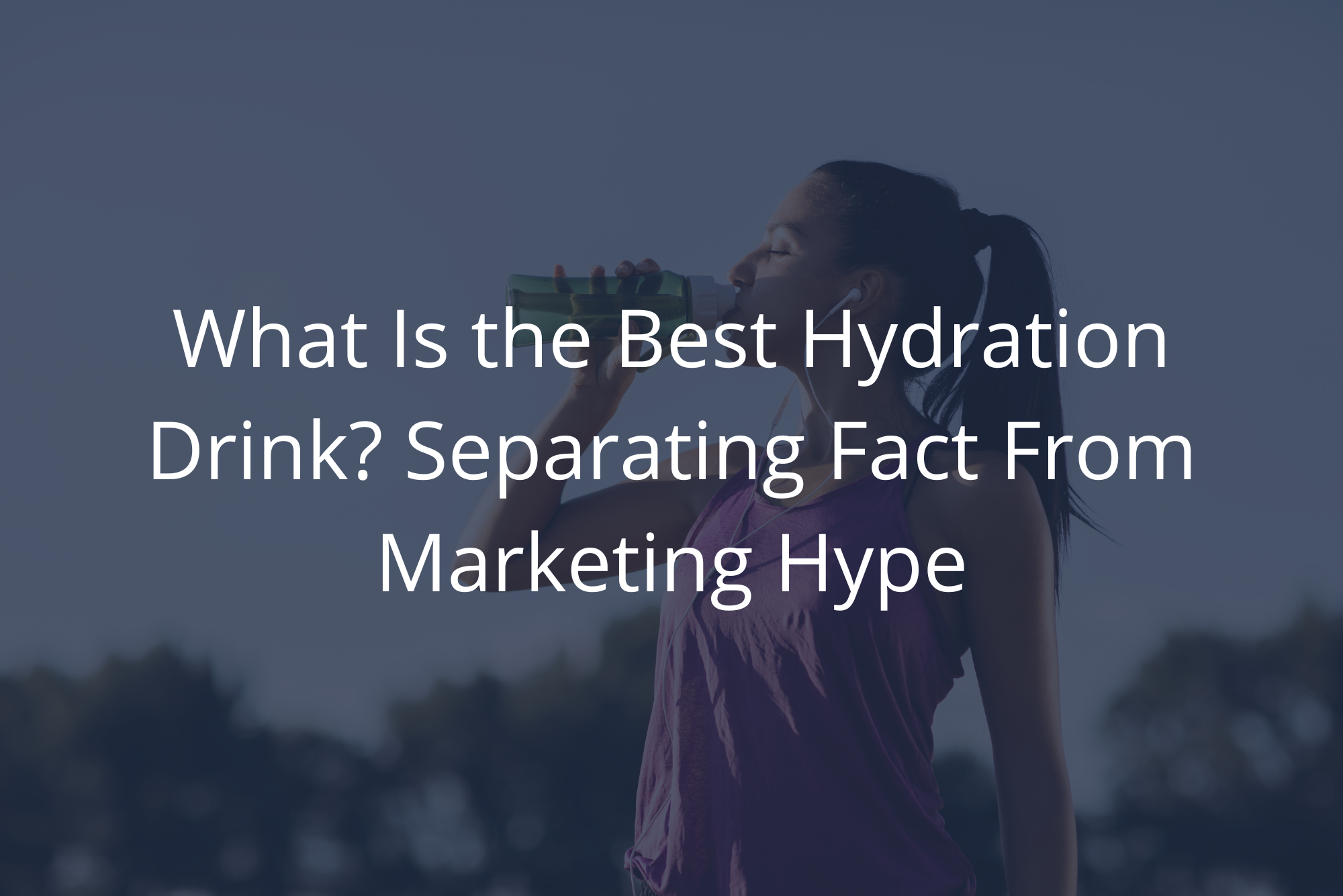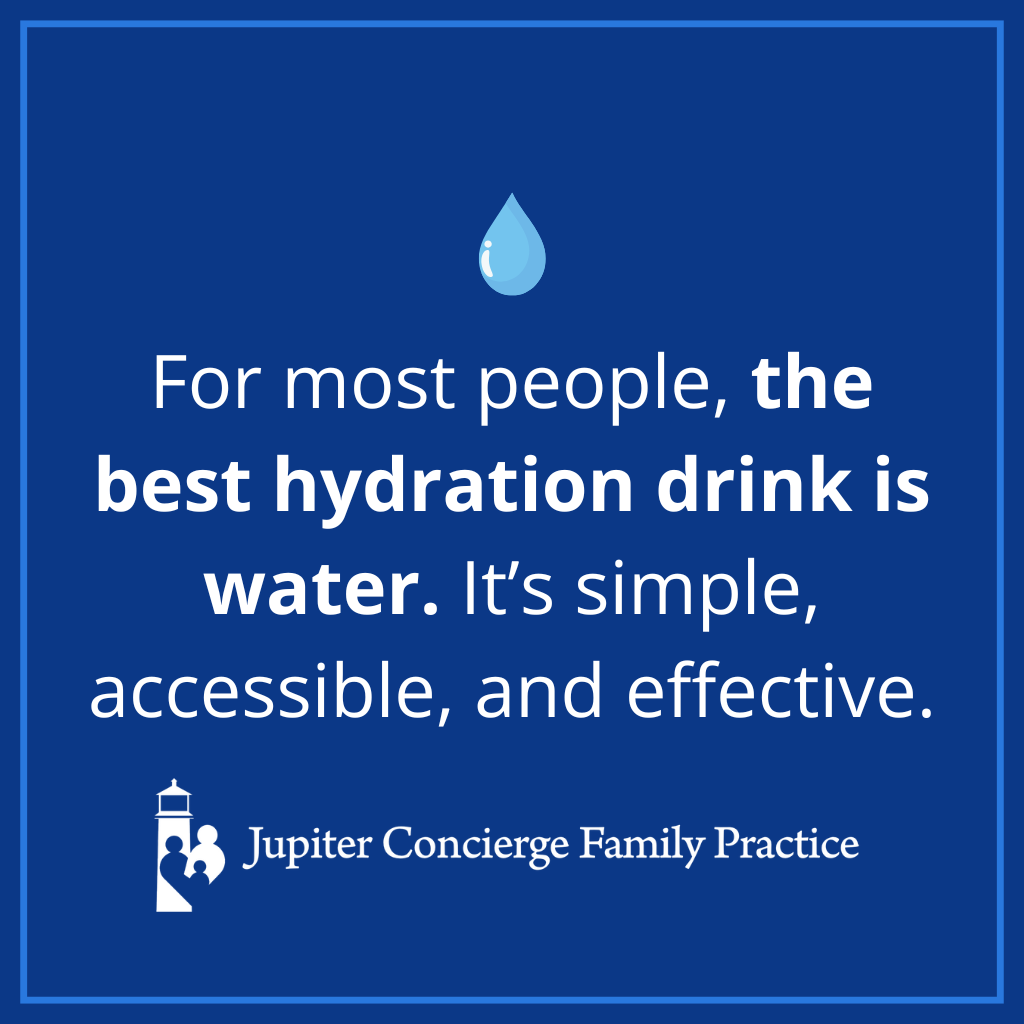
Everywhere you turn, there’s advertising pushing the next “advanced” hydration drink, each promising better energy, better performance, and better recovery.
Naturally, that leaves us asking, what is the best hydration drink?
Spoiler: The best hydration drink is water. It’s simple. It has no calories. It costs nothing. And it does exactly what your body needs: hydrates you.
But marketing is powerful, so let’s get into the whys and wherefores of hydration, electrolytes, water vs. sports drinks, and which products might be worth your time.
What Is the Best Hydration Drink: Water vs. Sports Drinks
If you’re just trying to stay hydrated, water is the most practical option. It’s been the gold standard for human hydration for thousands of years, and that hasn’t changed despite what modern ads might suggest.
That said, electrolytes have been shown to help the body absorb water more quickly, so they may make sense in some scenarios. But while those drinks might absorb a little faster, that speed is rarely necessary.
Unless you’re a high-performance athlete pushing yourself to the limit, that marginal increase in rate of absorption is far less important than just making sure you’re drinking enough water before and after exertion.
If this is you, then look for sports drinks that skip the sugar and artificial colors and instead focus on electrolytes.
The Problem With Sugar in Hydration Drinks
Many popular hydration drinks are loaded with sugar. It’s a known issue that’s caused much debate. Gatorade, for example, contains over 30 grams of sugar in a single 20-ounce bottle, and sometimes more! That’s a level similar to a can of soda — not exactly known for its high-performance benefits.
With these drinks, even as you hydrate, the high sugar content works against you.
Why? Because sugar isn’t just an empty calorie. It also messes with your insulin response and can promote stomach upset and even diarrhea — the opposite of what you want when trying to stay hydrated.
The best hydration drink you can choose will have little to no sugar (and no artificial coloring or additives).
Better Alternatives to Traditional Sports Drinks
Not everyone enjoys drinking plain water. If this is you, consider reaching for one of these healthy alternatives to sugary sports drinks when you want excellent hydration without the drawbacks:
- Coconut Water: This alternative to water and sports drinks contains natural electrolytes like potassium, sodium, and magnesium that aid absorption. Look for minimally processed versions without extra sugar or other additives.
- Unflavored Milk: As long as you’re not lactose intolerant, unflavored milk is an excellent natural hydration option. It has calcium, vitamin D, and protein, so it protects your bones and muscles while hydrating you.
- Green Tea: This age-old option provides hydration plus antioxidants that help protect your heart and reduce cancer risk. Again, look for products without added sugar or artificial ingredients.
- Kombucha: This fermented tea hydrates well while providing benefits for your gut health. Many brands add large quantities of sugar to their kombuchas, so always check the label.
- Electrolyte Powders: When free of excess sugars and artificial additives, electrolyte powders are excellent options for turning a simple bottle of water into a “sports drink.”
If you find yourself skipping water because of the taste, you can always improve the flavor without having to purchase special hydration drinks. A small pinch of salt, a splash of juice, or an electrolyte powder can make all the difference in staying consistently hydrated without excessive spending on specialty drinks.
When Fancy Hydration Drinks Actually Make Sense
While water wins in most situations, “fancy” hydration drinks have earned their place in specific situations.
Medical Conditions
Dehydration plays a role in so many common issues: fatigue, dizziness, low blood pressure, urinary tract infections, and even prostate problems. If you’re not getting enough water and it’s affecting your health, then yes — go ahead and reach for the flavored hydration option you’ll actually drink.
The number one goal is to get enough fluids. If that means using a product that encourages you to drink more, then it’s absolutely worth it.
Elite Performance
Elite athletes striving for excellence are in a unique situation.
When pushing your body to the edge, even small performance gains matter. Faster absorption, facilitated by electrolyte-rich fluids, can offer that extra edge. But again, that level of nuance doesn’t make a difference for the average person running or cycling for exercise.
GI Illnesses
When you’re sick, especially with gastrointestinal issues like vomiting or diarrhea, you lose fluids and key electrolytes like potassium. In these cases, your body needs support.
Hydration drinks alone won’t supply everything you need, but they can play a helpful role. However, getting your electrolytes from foods like bananas (high in potassium and binding for diarrhea) is far more effective than relying on fluids alone.
Young children dehydrate faster than adults and have more difficulty replacing lost electrolytes. In these situations, products like Pedialyte and Propel are helpful. I find Propel often wins on taste, which makes a big difference for compliance. If kids like the flavor, they’ll actually drink it.
Bottom Line: What Is the Best Hydration Drink?
For most people, the best hydration drink is water. It’s simple, accessible, and effective.
But if you need a little variety or have trouble staying consistent, look for drinks or powders with real electrolytes, few or no added sugars, and no artificial ingredients. And remember, staying hydrated throughout the day is far more important than worrying about absorption rates or fancy formulations.
The water vs. sports drinks debate doesn’t need to be complicated. Drink a little before exertion and a lot after, and you’ll be properly hydrated regardless of whether you choose plain water or one of the healthy alternatives mentioned above.


Dr. David Rosenberg
Dr. Rosenberg is a board-certified Family Physician. He received his medical degree from the University of Miami in 1988 and completed his residency in Family Medicine at The Washington Hospital in Washington, Pennsylvania in 1991. After practicing Emergency Medicine at Palm Beach Gardens Medical Center for two years, he started private practice in Jupiter, in 1993. He is an avid baseball fan and Beatles fanatic, since he was 8 years old. He has been married to his wife, Mary, since 1985 and has three grown children.
David completed additional studies at Mercer University, Macon, Georgia and obtained a BS in Chemistry in 1983.
“My interests include tennis, snow skiing, Pilates and self-development.”

